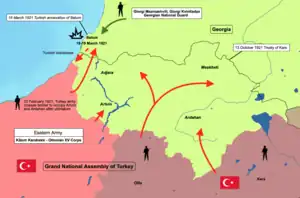| Battle of Batumi | |||||||
|---|---|---|---|---|---|---|---|
| Part of Red Army invasion of Georgia | |||||||
 Map of Turkish invasion of Georgia in 1921, and the battle of Batumi. | |||||||
| |||||||
| Belligerents | |||||||
|
|
| ||||||
| Commanders and leaders | |||||||
|
|
| ||||||
| Strength | |||||||
|
|
| ||||||
| Casualties and losses | |||||||
| More than 200 killed | 84 killed | ||||||
The Battle of Batumi was military battle between Democratic Republic of Georgia and Turkey. The Georgian aim of this battle was to remove the Turkish army from Batumi.
Background
During the Red Army invasion of Georgia, Turkey demanded the handover of Artvin and Ardahan Province to Georgia as an ultimatum. The Georgian government did not accept this ultimatum, although the mentioned cities were emptied, because it could not fight on two fronts, the Turkish army occupied the cities on February 23, which the Georgian government did not legally recognize. After that, the claims of the Turkish side seemed to have run out and they offered to help Georgia in the fight against the Russian Bolsheviks. On March 11, the leading units of the Turkish army entered Batumi. Their goal was to occupy the Batumi region, not to fight together with the Georgians against Bolshevik Russia, although this was a more adventurous step, because negotiations between Soviet Russia and Turkey were taking place in Moscow, which ended with the Treaty of Moscow on March 16, 1921. According to this agreement, Batumi District still remained unconquered Georgia, but Soviet Georgia. The Red army invasion of Georgia war was coming to an end, and a small number of Georgian units were stationed in Batumi district and on the Javakheti line. One group of the Russian army under the command of Dimitri Zhloba passed through the Goderdze pass to the back of the Georgian army in Batumi district.[1]
Battle
On March 17, based on the Turkish units in Batumi, Kâzım Karabekir declared himself the governor of Batumi district, the Turkish units occupied the barracks, post-telegraph, militia and other buildings. On March 17–18, as a result of the Kutaisi negotiations, the Red army invasion of Georgia ended. According to the decision of the founding assembly of the Democratic Republic of Georgia, the government went into exile and did not recognize the occupation of the country as legal. One of the main goals of the Kutaisi negotiations, together with the cessation of the war, was the expulsion of Turkish units from Batumi.[2][3] On March 18–19, the Georgian units under the command of General Giorgi Mazniashvili fought against the Turkish soldiers and managed to defeat them. On March 20, the Turks left Batumi.[3][4][2]
References
- ↑ Dimitri Silakadze, Democratic Republic of Georgia (1918–1921), Tbilisi, 2018, p. 60–61
- 1 2 "Making of Georgian nation p.174".
- 1 2 "Democratic republic of georgia (1918-21) p.60-61" (PDF).
- ↑ Rayfield, Donald (2012-12-15). Edge of Empires: A History of Georgia (Kindle ed.). London: Reaktion Books. ISBN 978-1-78023-030-6.